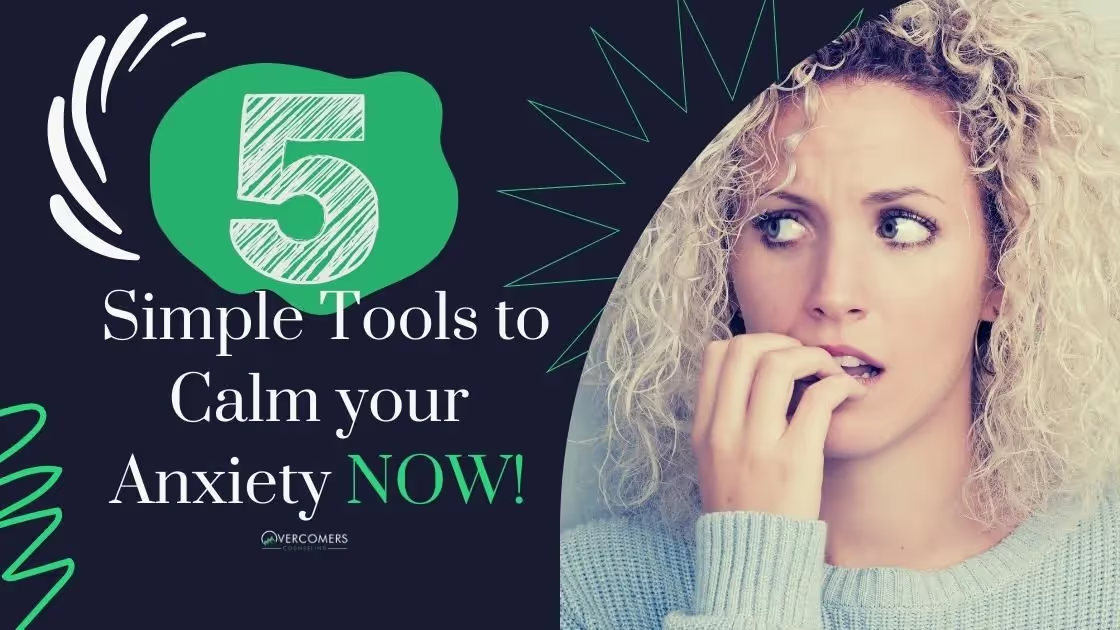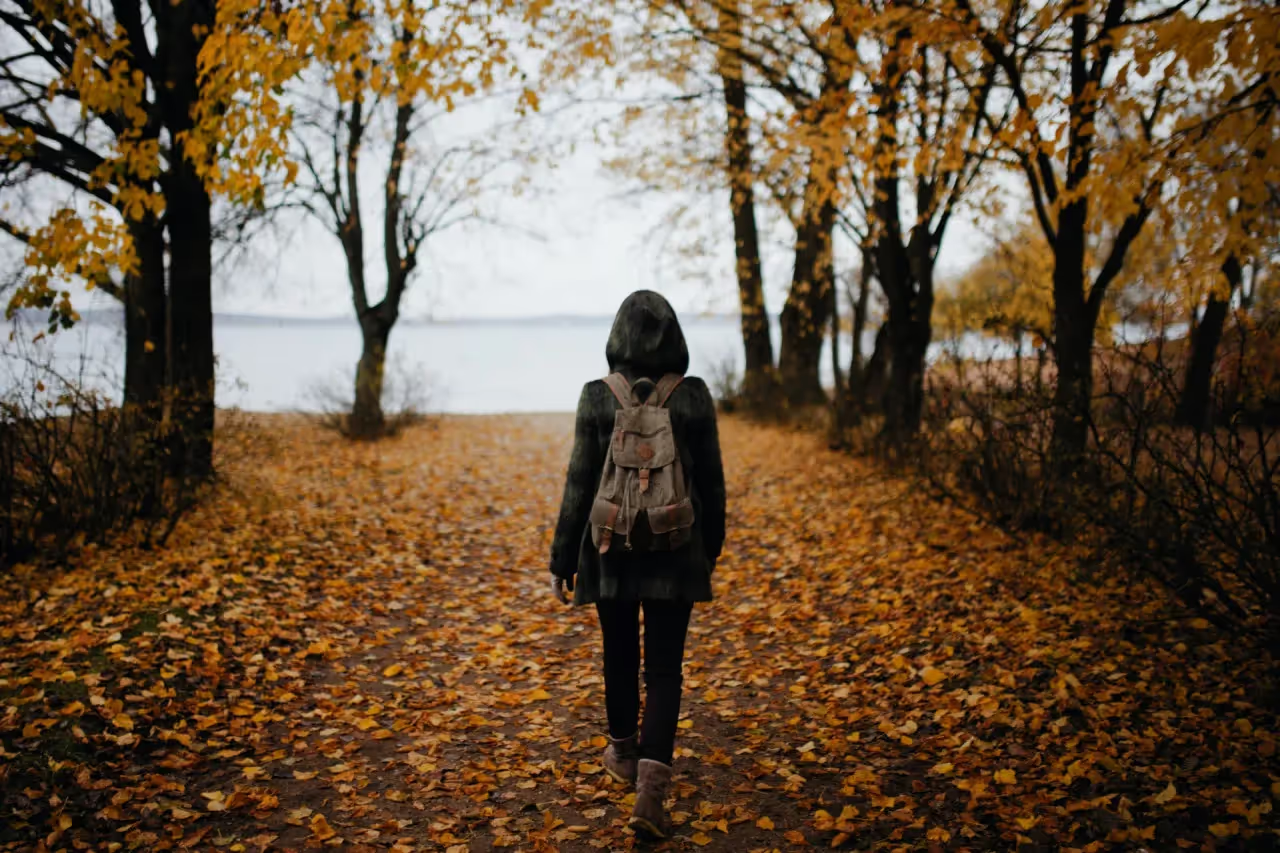Anxiety can be a beast.Period.Our hearts start to race, our palms begin to sweat, and it seems like our minds run a mile a minute. In these moments, it can...

Period.
Our hearts start to race, our palms begin to sweat, and it seems like our minds run a mile a minute.
In these moments, it can be SO difficult to remember tools that help us calm down.
This is where I come in.
Here are 5 coping skills for anxiety that I use for myself and my clients that seem to most effectively calm the mind and body quickly.
Coping Skill:
Look around the room and name 5 things you see, 5 things you hear, 5 things you smell and/or taste, and 5 things you feel.
Why It's Helpful:
This skill is a form of grounding.
Grounding brings you into the present moment and distracts you from your internal emotional experience by using your 5 senses.
By focusing on your external environment, you can increase your sense of safety and allow your body to relax.
This is my most used coping skill for anxiety.

2. Alternate Nostril Breathing
Coping Skill:
In Sanskrit, this is called Nadhi Shodhana Pranayama.
To do this breathing exercise, place your right finger and middle finger on your third eye center (the space in between your eyebrows).
Gently close off your right nostril with your thumb and breathe out completely.
Breathe in deeply and slowly through your left nostril.
Close your left nostril with your ring finger, and breathe out completely through your right nostril.
Now start again!
Breathe in through your right nostril while gently closing off your left nostril, breathe out through your left nostril while gently closing off your right.
Repeat for 10 cycles.
Why It's Helpful:
This yogic breathing technique is a coping skill for anxiety because it stimulates both hemispheres of the brain, which can allow us to relax and better process what's going on within.
It calms the mind, brings you into the present moment, and can even be therapeutic for the circulatory and respiratory systems.
3. Color Breathing Visualization
Coping Skill: Find a comfortable seat and either soften your gaze or close your eyes.
Bring to mind a color that represents warmth and relaxation.
Now, envision this color as a warm mist enveloping your body.
On your next inhale, visualize breathing in this colorful mist, sending it into your nostrils and throat.
As you exhale, allow this mist to again swirl around you and envelop you once more.
Breathe in, sending the color now to your lungs and belly.
Exhale, letting your body soften as the color and your anxiety gently leaves the body.
Inhale, sending the color now to your toe tips, fingertips, to the top of your head.
Now, breathe out and let your body completely soften as you feel the warmth the color leaves behind.
Repeat until your body feels completely relaxed.
Why It's Helpful:
This exercise combines deep breathing and grounding, two techniques that are helpful coping skills for anxiety.
Deep breathing can activate the parasympathetic nervous system, especially if our exhales are elongated.
By visualizing the warm color, we use grounding by activating our sense of vision which brings us back into the present moment.

Coping Skill: This could be a simple walk around your neighborhood or if you're up for something more intense, find a local hiking trail.
Pro Tip: Add some mindfulness to your walk.
Notice the trees, count the mailboxes, or challenge yourself to find some wildlife.
Why It's Helpful:
Movement is monumental!
Our energy can get stuck in our body and with no outlet, it can continue to cycle through our system.
Movement allows the energy to be released and flow through us.
According to Harvard Health, movement/exercise can make our fight/flight response less reactive, improve mood, and can even be as effective as psychotherapy and medication!
Coping Skill:
As soon as you notice your heart starting to race, or your thoughts quicken, go ahead and spend 15-20 minutes petting your furry friend.
Notice how their fur feels on on your hands, feel the warmth their body radiates, look at the different patterns and colors on their coat.
Make it a game and try and identify as many details about your pet as possible!
Why It's Helpful:
There has been A LOT of research that explores the physical and mental health benefits of owning pets.
Some findings include that simply petting our animals can decrease cortisol (stress hormone), increase oxytocin (the bonding chemical), and elevate serotonin and dopamine (feel-good chemicals).
This can lead to an overall decrease in anxiety, depression, and feelings of loneliness!
Anxiety can feel really overwhelming at times!
With these coping skills for anxiety, you can and will tackle those scary moments and return to a place of relaxation.
I invite you to practice these coping skills for anxiety at least three times a day.
Test them out, see which ones work best for you, and let me know what you think in the comments below!
Ignoring anxiety can exacerbate symptoms and make it more challenging to manage over time. This can result in a negative impact on your personal, professional, and social life, leading to feelings of isolation and even depression.
It's important that you feel comfortable discussing personal matters with your therapist in order to open up and get more out of therapy sessions; therefore finding someone who meets certain criteria like experience level, expertise areas, and personality is key when selecting a therapist who can give meaningful feedback about how best handle issues related to anxiety or other mental health concerns.
Yes, Medicaid provides insurance coverage for therapy services specifically designed to help individuals struggling with anxiety, depression, and other mental health conditions.
Other activities which have been found helpful in reducing both immediate feelings of anxiousness and long-term anxieties associated with chronic disorders include yoga, journaling, nature walks, art therapy, volunteering, and other low-stress activities. Additionally, developing a healthy lifestyle incorporating adequate sleep, physical activity, and nutritious meals can help reduce overall stress levels.
The duration of anxiety counseling varies for each individual, depending on the severity of their anxiety and their progress in therapy. Our therapists will regularly assess your progress and adjust your treatment plan as needed.
Addressing anxiety is crucial because it can significantly impact your quality of life and overall well-being. Left untreated, anxiety can lead to more severe mental health issues, relationship problems, and difficulty functioning in daily life.